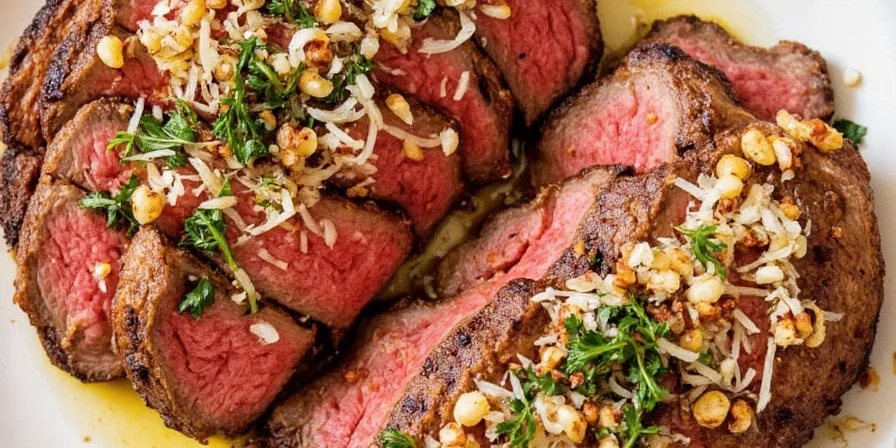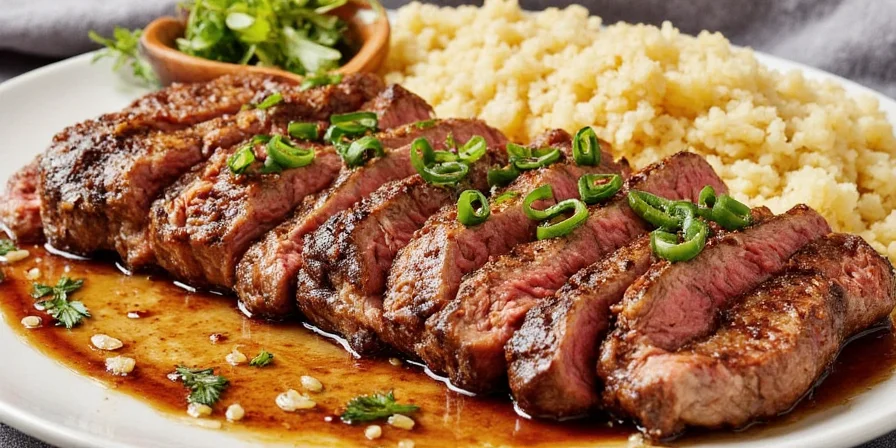Introduction: When Beef Meets Butter and Spices Dance
There's something magical that happens when a perfectly seared steak meets a dollop of warm, melting garlic butter. But what if we told you it could be even better? Enter: innovative spice pairings. This guide is designed specifically for home cooks and grill enthusiasts seeking to transform ordinary steak nights into extraordinary culinary experiences. You'll gain actionable knowledge about fat-soluble flavor compounds and scientifically backed pairings that deliver restaurant-quality results without rare ingredients.
Whether you're hosting a dinner party or upgrading weeknight meals, these evidence-based spice hacks unlock flavor synergies you never knew existed. Let's explore!
Table of Contents
- Garlic Butter 101: The Base Worth Perfecting
- Spice It Up: 10 Unexpected (But Amazing) Flavor Combos
- Pro Tips for Perfectly Balanced Butter Blends
- Pairing Spices with Cuts of Steak
- The Flavor Chemistry Behind Perfect Pairings
- Beyond the Pan: Creative Ways to Use Garlic Butter
- Frequently Asked Questions
- Conclusion: Spice It Like You Mean It
Garlic Butter 101: The Base Worth Perfecting
Before exploring spices, master the foundation. A superior garlic butter balances simplicity with precision—acting as the perfect carrier for flavor compounds.
The Classic Blend
- Salted or unsalted butter (room temperature)
- Fresh garlic, finely minced or grated
- A pinch of salt
- Freshly ground black pepper
- Optional: chopped parsley or chives
Mix ingredients until combined. Form into a log using parchment paper and chill until firm, or use immediately. This base becomes your canvas for innovation.
Spice It Up: 10 Unexpected (But Amazing) Flavor Combos
Move beyond basic herbs with these scientifically curated pairings. Each leverages lipid solubility principles where butter's fat content optimally carries flavor compounds to your palate.
| Spice | Flavor Profile | Why It Works | Recommended Amount per 1/2 cup butter |
|---|---|---|---|
| Paprika (Smoked vs. Sweet) | Earthy, smoky or mild and sweet | Adds depth through pyrazine compounds that mirror Maillard reaction products | 1–2 tsp |
| Cayenne Pepper | Hot and spicy | Capsaicin dissolves in butter fat, distributing heat evenly without bitterness | 1/4–1/2 tsp |
| Espelette Pepper | Fruity, mildly spicy | Lower capsaicin content provides complexity without overwhelming heat | 1/2 tsp |
| Chili Flakes (Crushed Red Pepper) | Sharp, fiery | Texture contrast enhances mouthfeel while fat carries capsaicin | 1/2–1 tsp |
| Urfa Biber | Smoky, raisin-like heat | Unique processing creates synergistic compounds with seared meat flavors | 1 tsp |
| Gochugaru (Korean Chili Flakes) | Earthy, bright, and slightly fruity | Fermentation-derived compounds complement butter's fatty acids | 1 tsp |
| Sumac | Zesty, citrusy | Tartaric acid cuts through richness while enhancing umami perception | 1 tsp |
| Black Garlic Powder | Umami-rich, earthy-sweet | Fermentation creates glutamates that amplify meat's natural savoriness | 1/2 tsp |
| Coriander Seed Powder | Citrusy, warm, and nutty | Linalool compounds harmonize with garlic's allicin for balanced complexity | 1 tsp |
| Dried Lemon Zest | Bright, tart, floral | Limonene oils blend seamlessly with butter fat for vibrant acidity | 1 tsp zest |
Pro Tips for Perfectly Balanced Butter Blends
Master flavor equilibrium with these evidence-based techniques:
- Taste incrementally: Test small batches melted in a pan to evaluate heat distribution and flavor release.
- Toast spices strategically: Dry-toast coriander or cumin to activate volatile compounds, but avoid burning which creates bitter pyrazines.
- Balance texture intentionally: Combine smooth spices (paprika) with textural elements (chili flakes) for multi-sensory appeal.
- Leverage acid science: Add 1/4 tsp citric acid instead of lemon juice for precise tartness without moisture dilution.
- Allow molecular integration: Refrigerate blends 24 hours for optimal flavor compound diffusion through the fat matrix.

Pairing Spices with Cuts of Steak
Different cuts require tailored approaches based on fat content and protein structure:
| Steak Cut | Best Spice Pairings |
|---|---|
| Ribeye | Smoked paprika, Urfa Biber, black garlic powder |
| New York Strip | Cayenne pepper, coriander seed powder |
| Filet Mignon | Sumac, dried lemon zest |
| Skirt Steak | Chili flakes, Espelette pepper |
| Flat Iron | Gochugaru, cayenne pepper |
The Flavor Chemistry Behind Perfect Pairings
Understanding lipid solubility transforms guessing into precision. Butter's fat content acts as a solvent for hydrophobic flavor compounds found in most spices. Capsaicin (chili heat) and eugenol (clove spice) are fat-soluble, meaning butter delivers these compounds more effectively than water-based carriers. Meanwhile, seared steak produces heterocyclic amines that synergize with smoky compounds like guaiacol in Urfa Biber. This explains why our recommended pairings aren't arbitrary—they're chemically optimized for maximum flavor release on your palate. The tartaric acid in sumac also lowers the pH threshold for umami receptors, making lean cuts like filet taste richer.
Beyond the Pan: Creative Ways to Use Garlic Butter
Extend these principles beyond steak:
- Drizzle over roasted vegetables: Especially carrots, Brussels sprouts, or corn.
- Slather on baked potatoes: Add a sprinkle of cheddar or bacon bits for extra indulgence.
- Melt into risotto: Instant creamy upgrade with a kick.
- Brush onto grilled bread: For a spicy, garlicky bruschetta situation.
- Stir into mashed potatoes: Silky, savory, and oh-so-delicious.

Frequently Asked Questions
Can I use dried garlic instead of fresh in the base butter?
Yes, but use half the amount since dried garlic is more concentrated. Fresh garlic provides allicin compounds that create brighter flavor, while dried offers mellower alliin. For optimal lipid solubility, rehydrate dried garlic in 1 tsp warm olive oil before mixing.
How long can spiced garlic butter be stored safely?
Refrigerated in an airtight container, it lasts 14 days. Freezing extends shelf life to 3 months. The critical factor is water activity—never add fresh herbs directly as their moisture creates botulism risk. Always use completely dry ingredients for safe storage.
Why do some spices taste bitter when added to butter?
Bitterness occurs when spices are overheated during toasting, creating acrid pyrazine compounds. To prevent this, toast spices at 300°F (150°C) for 2-3 minutes max. Alternatively, use pre-toasted spice blends where manufacturers control thermal decomposition precisely.
Conclusion: Spice It Like You Mean It
Garlic butter becomes extraordinary when we harness flavor chemistry principles. From understanding lipid solubility to leveraging Maillard reaction synergies, these science-backed pairings transform ordinary steaks into multisensory experiences. Next time you're prepping dinner, choose spices based on molecular compatibility—not just tradition. Your palate will detect the difference immediately.
Now go forth, apply these principles boldly, and most importantly… butter happily ever after.










 浙公网安备
33010002000092号
浙公网安备
33010002000092号 浙B2-20120091-4
浙B2-20120091-4